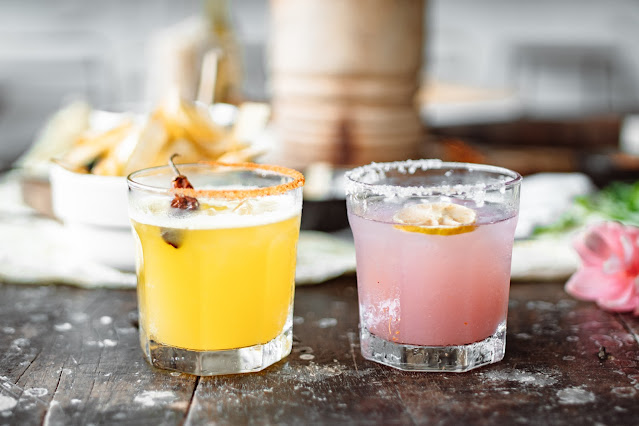Imagine a zero-alcohol drink that has the aroma and taste of tequila.
A golden hue greets you upon pouring, while a traditional blue agave aroma and ripe tropical guava follow suit. Earthy mesquite smoke, clean spice, and a kiss of sea salt complete the experience.
Agave
The agave plant, or maguey, is a succulent from the Asparagaceae family native to the arid regions of Mexico and the Caribbean. It has been used for centuries by indigenous people for food, fiber, and medicine, including the boiled sweetener known as agave nectar. Its stem is incredibly dense in carbohydrates immediately before flowering and is harvested to produce tequila and mezcal alcohol.
As tequila recovers from its reputation as the spirit of bad decisions and blacked-out college years, its sister mezcal is sashaying onto craft cocktail menus. In addition, a growing number of bars and restaurants are stocking shelves with tequila alternatives like bacanora and pulque.
In cocktails, tequila alternatives pair well with citrusy, tropical flavors such as cilantro lime and tropical guava. They also work with savory tomato juices in margaritas and palomas. And they add a smoky, herbal, earthy element to drinks with agave syrup or honey.
In addition to a lower glycemic index than table sugar, agave syrup has a high level of beneficial fats that can help boost metabolism and lower cholesterol levels. It also contains minerals like potassium, selenium, and folate. Unlike fructose, which many people can’t properly digest, agave syrup is digested by the body and converted to energy without raising blood glucose or insulin levels. That makes it a healthier alternative to white sugar and other liquid sweeteners.
Aesthetics
With golden color, these non-alcoholic spirits look most like a reposado tequila. It smells smoky, like mezcal or charred wood, and it tastes sweet with a spicy finish. It blends well in drinks with spice, especially margaritas. It also works in mules and sour mix drinks.
It has a low alcohol content of less than 0.5%, making it suitable for many people. However, it does contain a small amount of sugar, so you should be careful when adding it to a diet. In addition, it contains glycerol and citric acid for natural flavors and sodium benzoate and potassium sorbate as preservatives.
Add a tequila alternative to a glass of tonic water for an impressive mocktail, and garnish with a jalapeno slice and basil. Allow the jalapeno to soak for 15 minutes to make it spicier. The result is a refreshing drink that you can enjoy all year round.
Mezcal
Mezcal is a spirit with a unique flavor with much to offer to drinkers. Its savory and potent flavor has made it a popular alternative to tequila in cocktails and on the rocks. It is also one of the lowest-calorie liquors when served straight without mixers. This may help those looking to limit their sugar intake while still enjoying a spirit with a bit of a buzz.
Mezcals can be enjoyed alone or with a variety of mixers and foods. Its earthy, smokey flavor pairs well with citrus, fruits, and other foods. It can even be mixed with ice to make margaritas or juleps. A splash of honey or lime can also enhance its smoky undertones.
A mezcal’s flavor is influenced by the type of agave used to make it and the distillation and cooking processes. Some mezcals are aged in barrels, creating a more complex and nuanced spirit.
Mezcals are becoming increasingly popular in the US thanks to a growing interest in artisanal spirits. Several mezcal brands have emerged in the past decade. These mezcals are sourced from families operating their palenquero (distillery). The founders of these mezcal brands understand sustainability. They have incorporated youth into their businesses and have combined knowledge of the North American market with traditional mezcal production practices.
Taste
Unlike most spirits, tequila doesn’t spike blood sugar levels, making it one of the healthiest alcohol options you can drink. It also contains agavins, which are non-digestible sugars that provide an excellent source of dietary fiber. This helps your body burn calories and lower cholesterol.
Tequila has also been shown to have prebiotic and probiotic properties. It detoxifies the skin and reduces bloating. It is also a natural astringent that removes oil and cleans pores. In addition, it has a high amount of potassium and calcium, which help balance blood pressure and prevent strokes.
The agave plant has also been shown to have anti-inflammatory properties. It can help treat inflammatory conditions such as Crohn’s disease and irritable bowel syndrome. It can also improve bone strength and prevent osteoporosis. It also promotes fat metabolism and boosts energy.
The tequila alternative has a delicious taste reminiscent of real tequila. It smells fresh and has a subtle agave aroma, making it the perfect ingredient for cocktails. It’s also calorie-free and contains no artificial colors or flavors. You can mix it with various ingredients to create the best non-alcoholic margarita. You can even use it to make other non-alcoholic cocktails, such as a mojito. Try pairing it with lime and orange juices for a more authentic taste.

No comments
Post a Comment
Thanks for stopping by today